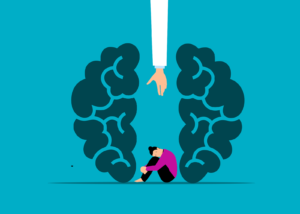
The journey to completing a dissertation is one of the most challenging academic undertakings, often described as a marathon rather than a sprint. For many students, the dissertation is not just another academic task; it’s the culmination of years of study, and the pressure to succeed can feel immense. As the deadlines loom and expectations grow, it’s common for students to experience heightened levels of stress, anxiety, and even self-doubt. With October being Mental Health Month, it’s the perfect time to shine a light on the importance of mental well-being in the dissertation process. After all, the mind is our most powerful tool, and prioritizing mental health can be the key to unlocking success in this intense academic journey.
If you’re working on your dissertation right now, you don’t need me to tell you that it’s one of the most intense and demanding projects you’ll ever tackle in your academic career. For many, the pressure feels unrelenting. You’re juggling research, writing, revisions, dissertation editing, and possibly teaching or working part-time—all while trying to maintain some semblance of social life and personal well-being. It’s not unusual to feel like there’s not enough time in the day, and it’s all too easy to push your mental health to the back burner. But the reality is that ignoring your mental health can lead to a cycle of stress and burnout that ultimately slows down your progress.
Let’s be real: dissertation writing is often seen as a solitary and isolating endeavor. You might find yourself working late into the night, staring at pages of notes or re-reading articles until the words blur together. The expectations, both internal and external, can feel suffocating. Advisors want to see progress, deadlines loom, and sometimes, it feels like everyone around you is advancing while you’re stuck in the mud. Sometimes, if you do not seek dissertation help, the pressure can make you doubt your abilities, and suddenly, something that started as an exciting intellectual challenge feels like an overwhelming burden.
That’s why this conversation about mental health is crucial. It’s easy to think that grinding harder and sacrificing self-care will get you to the finish line faster. But in reality, prioritizing your mental well-being is important for your health and essential for your success. A clear, focused mind works far better than one that’s exhausted and stressed. When you feel good mentally, you can approach your work with greater energy, creativity, and resilience.
So, this Mental Health Month, we’re taking a moment to acknowledge the pressures of writing a dissertation and remind you that your mental health matters as much as those meticulously crafted chapters. After all, your dissertation isn’t just a test of your academic ability; it’s also a test of endurance, emotional strength, and balance.
The Link Between Mental Health and Academic Success

When you’re knee-deep in dissertation writing, it’s easy to compartmentalize your mental health from your academic progress. After all, writing a dissertation feels like an intellectual marathon—you’re trying to push through writing a literature review and qualitative or quantitative methodologies, collecting data, conducting statistical or qualitative analysis, and meeting deadlines. However, many students don’t realize that your mental well-being and academic success are deeply intertwined. If you’re not taking care of your mental health, it can significantly impact your ability to complete your work efficiently and effectively.
Stress and Burnout: A Barrier to Success
First, let’s talk about stress. Some level of stress is inevitable when tackling something as large as a dissertation, but chronic stress—when it becomes part of your daily life—can severely hinder your productivity. According to McEwen (2006), chronic stress affects the brain’s ability to function properly by shrinking the prefrontal cortex, the area responsible for decision-making and memory, while enlarging the amygdala, which controls fear and anxiety. This imbalance makes concentrating, retaining information, and working through complex tasks like organizing research or writing coherent arguments harder.
 The problem with pushing through stress without addressing it is that it often leads to burnout. Burnout is more than just being tired—it’s a state of emotional, mental, and physical exhaustion caused by prolonged stress (McEwen, 2006). In the context of academic work, burnout can make tasks that once seemed manageable feel impossible, especially if you are tackling sensitive but complex areas like statistical analysis. A 2020 study published in the Journal of Educational Psychology found that academic burnout directly correlates with decreased performance, higher dropout rates, and diminished mental health in graduate students (Vizoso et al., 2019). When burnout takes over, your dissertation may stall out, not because you’re incapable but because your mind and body have reached their limit.
The problem with pushing through stress without addressing it is that it often leads to burnout. Burnout is more than just being tired—it’s a state of emotional, mental, and physical exhaustion caused by prolonged stress (McEwen, 2006). In the context of academic work, burnout can make tasks that once seemed manageable feel impossible, especially if you are tackling sensitive but complex areas like statistical analysis. A 2020 study published in the Journal of Educational Psychology found that academic burnout directly correlates with decreased performance, higher dropout rates, and diminished mental health in graduate students (Vizoso et al., 2019). When burnout takes over, your dissertation may stall out, not because you’re incapable but because your mind and body have reached their limit.
Focus and Productivity: The Cognitive Connection
Mental health doesn’t just affect how you feel emotionally—it directly impacts how your brain functions. When you’re anxious, depressed, or overwhelmed, your ability to focus diminishes. A study published by Matthew Owens, one of the leading education psychologists at the University of Exeter, found that students experiencing higher levels of anxiety or depression reported greater difficulty concentrating, retaining information, and completing assignments (Owens et al., 2012). This is because stress hormones, like cortisol, can impair cognitive function, making it harder to process information and think critically, both of which are key to completing a dissertation.
It’s not uncommon for students to find themselves in a cycle of feeling behind on their dissertation, leading to increased anxiety, which then further impacts their ability to focus. When you’re unable to focus, tasks take longer, which leads to more stress—and the cycle continues. That’s why it’s essential to prioritize mental health to keep your brain functioning optimally.
Emotional Resilience: Managing Setbacks
Another way mental health plays a critical role in academic success is through emotional resilience. Writing a dissertation is never a smooth process, especially after you have successfully developed a topic, which is when the real work begins. You’ll face setbacks—whether it’s a rejected chapter, difficult feedback from your advisor, or hitting a roadblock in your research. If your mental health is suffering, these setbacks can feel insurmountable.
Poor mental health can amplify feelings of inadequacy or imposter syndrome, where you may start doubting your abilities altogether. Research supports this connection between mental health and resilience. The most recent mental health research in education by Orellana (2024) showed that graduate students who practice self-care and prioritize mental health demonstrate higher levels of emotional resilience and are better equipped to handle the inevitable challenges of academic life. When you are emotionally resilient, you’re more likely to see setbacks as temporary and manageable rather than signs of failure.
Ultimately, mental health isn’t a luxury or something to think about after you’ve finished your dissertation. It’s a fundamental part of your ability to succeed. When you take care of your mental well-being—whether through stress management, therapy, or simply making time for rest—you’re not just taking care of yourself; you’re enhancing your academic performance. Your brain is sharper, your focus is clearer, and your resilience is stronger. By recognizing the deep connection between mental health and academic success, you give yourself the best possible chance to not just survive the dissertation process but to thrive within it. As Mental Health Month highlights the importance of taking care of ourselves, now is the perfect time to evaluate how your mental health is affecting your work—and to make adjustments that benefit both your well-being and your dissertation progress.
Signs of Mental Health Struggles During the Dissertation Process
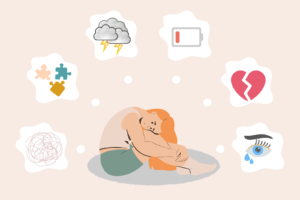
When you’re in the midst of writing a dissertation, it’s easy to dismiss feelings of stress, anxiety, or exhaustion as just part of the process. After all, isn’t it normal to feel overwhelmed when tackling such a massive project? Especially when developing undertaking sections that need massive tasks like literature review and qualitative or statistical data analysis. While some stress is inevitable when handling these tasks, it’s important to recognize when those feelings are signaling deeper mental health struggles. Being able to identify the signs of declining mental well-being can make all the difference between pushing through healthily and spiraling into burnout.
Physical and Emotional Fatigue
One of the earliest and most telling signs that your mental health might be suffering is fatigue—both physical and emotional. Dissertation work is a slow burn, not a quick flame, and for those who might not have the finances for dissertation assistance, long hours hunched over books or a computer can leave them feeling drained. But if you find yourself constantly exhausted, even after a full night’s sleep, or feeling like you can never “catch up” on rest, it may be more than just working hard. According to Afari & Buchwald (2003), chronic fatigue isn’t just physical tiredness; it’s also emotional.
If you’re waking up each day with a heavy sense of dread or feeling emotionally detached from your work, these could be signs of deeper issues like depression or burnout. Research has shown that emotional exhaustion is one of the primary indicators of burnout, particularly in high-stakes academic environments. Previous research found that emotional exhaustion among graduate students leads to reduced academic performance and, eventually, an increased likelihood of dropping out (Boren, 2013). If you’re noticing that even small tasks feel overwhelming or that your motivation is completely sapped, it’s a strong indication that your mental health needs attention.
Procrastination and Lack of Motivation
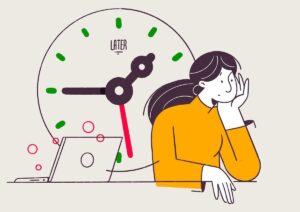 Every dissertation student has moments where they struggle with procrastination—putting off writing or research for another day. But when procrastination becomes a chronic problem, it’s often a red flag for underlying mental health issues. When mental health suffers, motivation often plummets. It’s not just about putting off tasks because you’d rather be doing something else; it’s about not being able to summon the energy or focus to begin in the first place. Procrastination, particularly when it’s tied to anxiety or depression, can lead to a vicious cycle.
Every dissertation student has moments where they struggle with procrastination—putting off writing or research for another day. But when procrastination becomes a chronic problem, it’s often a red flag for underlying mental health issues. When mental health suffers, motivation often plummets. It’s not just about putting off tasks because you’d rather be doing something else; it’s about not being able to summon the energy or focus to begin in the first place. Procrastination, particularly when it’s tied to anxiety or depression, can lead to a vicious cycle.
You delay starting a task because it feels too overwhelming, which leads to guilt and more anxiety about falling behind. Research published in Behaviour Research and Therapy found that students with higher levels of anxiety were significantly more likely to procrastinate, which, in turn, exacerbated their anxiety (Sirois & Pychyl, 2013). It’s a self-perpetuating loop that becomes harder to break the longer it goes unchecked. If you’re finding it increasingly difficult to sit down and get started or if days of inactivity are turning into weeks, it’s worth reflecting on whether underlying stress, anxiety, or depression may be the cause.
Perfectionism and Imposter Syndrome
Many dissertation students grapple with perfectionism, especially in a field where your work is constantly being evaluated and critiqued by dissertation editors. On the surface, perfectionism might seem like a good thing—it drives you to produce high-quality work and to meet high standards. However, when perfectionism becomes excessive, it can be paralyzing. If you do not seek dissertation help, particularly academic editing services, you might find yourself endlessly revising a single chapter, terrified of submitting anything less than flawless. This constant need for perfection often leads to delays and prevents you from making real progress.
Moreover, perfectionism is often closely tied to imposter syndrome, the persistent feeling that you’re not good enough or that you don’t belong in academia. Imposter syndrome can make every step of the dissertation process feel like a test you’re bound to fail. Anna Parkman, a professor of professional practice in agribusiness and applied economics, noted in her review of imposter syndrome among graduate students that those who experienced high levels of imposter feelings were more likely to suffer from anxiety, depression, and overall lower academic performance (Parkman, 2016). If you find yourself constantly doubting your abilities or fearing that your advisor or peers will “find out” you don’t deserve to be in your program, it’s a strong indication that your mental health is taking a hit.
Social Withdrawal and Isolation
The dissertation process can be incredibly isolating by nature—you often work alone, spend long hours in the library, or hunched over your computer. However, if you find yourself withdrawing from social interactions entirely or feeling increasingly isolated, it might be a sign that your mental health is deteriorating. Isolation can deepen feelings of loneliness, depression, and anxiety, making it even harder to stay motivated or focused on your work. According to Dr. Parkman, social isolation in graduate students is linked to higher rates of depression and lower overall well-being (Parkman, 2016). While it’s important to carve out time for focused work, it’s equally crucial to maintain connections with others, whether through regular check-ins with friends, family, or a supportive peer group.
Don’t Ignore the Signs

Recognizing the signs of mental health struggles is the first step in addressing them. It’s easy to dismiss feelings of fatigue, procrastination, perfectionism, or isolation as just part of the academic process, but when these issues persist or worsen, it’s time to pay attention. The dissertation journey is demanding, but it shouldn’t come at the cost of your mental health. If you’re noticing any of these signs in yourself, it’s a good moment to pause and assess how you can better care for your mental well-being. Whether reaching out for support for your qualitative research or statistical analysis, setting more realistic goals, or simply permitting yourself to rest, taking action now can make the difference between healthily finishing your dissertation and struggling through unnecessary burnout.
Prioritizing Mental Health: Tips for Dissertation Students
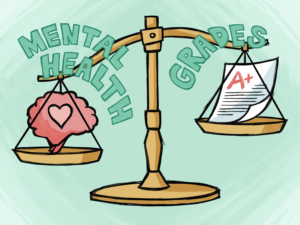
Prioritizing your mental health while writing a dissertation can feel like an impossible balancing act. The looming deadlines, pressure to perform, and constant workload make it easy to think you don’t have time for self-care. But here’s the truth: taking care of your mental well-being is not a luxury—it’s a necessity. Neglecting your mental health can lead to burnout, procrastination, and even a complete derailment of your dissertation progress. The good news is that there are practical steps you can take to manage both your work and your well-being. Below are some effective strategies to help you prioritize mental health without sacrificing academic success.
Develop a Routine with Breaks
One of the biggest mistakes dissertation students make is treating every day like a sprint to the finish line, working nonstop until they’re exhausted. This approach may work in the short term, but it’s unsustainable over months, or even years, of intense research and writing from introduction to discussion. Establishing a routine that balances work with regular breaks is essential for maintaining energy and avoiding burnout. Research shows that our brains are not designed to focus intensely for long periods without breaks (Boren, 2013).
Previous research also highlights that taking short, regular breaks during periods of deep focus actually helps maintain concentration and improves overall productivity (Ariga & Lleras, 2011). By incorporating structured breaks into your daily routine, you allow your brain the rest it needs to stay sharp and creative. Try using the Pomodoro Technique, where you work for 25 minutes and then take a 5-minute break. After four cycles, take a longer break of 15–30 minutes. This method not only helps you maintain focus but also prevents you from feeling overwhelmed by the sheer size of your dissertation tasks. It gives you the mental space to recharge throughout the day.
Set Realistic Goals
It’s easy to feel like you should be writing hundreds of pages or completing entire chapters like a literature review (which is often over 30 pages) in one sitting. However, setting unrealistic goals can lead to frustration and feelings of inadequacy when you inevitably fall short. Instead, break your dissertation down into smaller, more manageable tasks. These micro-goals will help you feel a sense of progress and keep you motivated. Psychologists refer to this as “chunking,” and studies suggest that breaking large tasks into smaller, bite-sized pieces makes them less intimidating and more achievable.
Professor Edwin A. Locke, one of the leading American psychologists known for his pioneering work in goal-setting theory, published an article, “Building a practically useful theory of goal setting and task motivation,” in The Journal of Applied Psychology. In this article, he highlighted that setting smaller, more immediate goals was correlated with higher levels of task completion and satisfaction (Locke & Latham, 2002). He also stressed that by focusing on one section, one page, or even one paragraph at a time, students are less likely to feel overwhelmed. A simple goal-setting strategy for you could be to write 500 words a day or spend two hours working on a particular section. Celebrate these small victories—they add up over time and make the massive task of writing a dissertation feel much more conceivable.
Seek Support
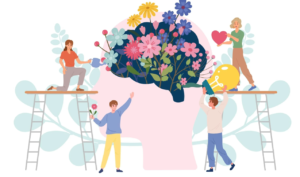 One of the most detrimental aspects of the dissertation process is the feeling that you have to do it all on your own. The truth is writing a dissertation can be isolating, and without a support system, it’s easy to feel like you’re drowning in the workload. Reaching out for help—whether it’s from peers, mentors, family, or professional services—can make a huge difference in your mental health and overall progress. Don’t underestimate the power of social connections. Reeve et al. (2013) researched how perceived stress and social support impacted undergraduate nursing students’ educational experiences.
One of the most detrimental aspects of the dissertation process is the feeling that you have to do it all on your own. The truth is writing a dissertation can be isolating, and without a support system, it’s easy to feel like you’re drowning in the workload. Reaching out for help—whether it’s from peers, mentors, family, or professional services—can make a huge difference in your mental health and overall progress. Don’t underestimate the power of social connections. Reeve et al. (2013) researched how perceived stress and social support impacted undergraduate nursing students’ educational experiences.
The results indicated that students who maintained strong social ties during stressful academic periods reported higher levels of well-being and lower levels of anxiety and depression. Whether it’s a fellow student who understands what you’re going through or a therapist who can offer professional guidance, building a network of support is essential. If you’re struggling with specific academic challenges, consider joining a writing group or seeking feedback from your advisor. Sometimes, just knowing that someone else is there to offer encouragement or a fresh perspective can alleviate the burden of feeling like you’re in it alone.
Practice Self-Compassion
The dissertation process can bring out harsh self-criticism. Many students feel like they’re constantly falling short of their own expectations or the expectations of their advisors. But constantly beating yourself up over setbacks or perceived failures only worsens your mental state and makes it harder to get back on track. Practicing self-compassion means treating yourself with the same kindness and understanding that you would offer a friend. Research by Neff (2011) found that self-compassion helps reduce negative mental health outcomes like depression, anxiety, and stress, particularly in high-pressure environments.
When you approach your work with kindness, acknowledging that mistakes are a natural part of the learning process, it’s easier to bounce back from challenges. This might mean permitting yourself to take a day off when you need it or acknowledging that progress is still progress, even if it’s slower than you’d like. Shavings make a pile. The dissertation journey is long and full of ups and downs—self-compassion helps you weather those lows without losing momentum.
Create Boundaries Between Work and Rest
It’s easy to let dissertation work bleed into every corner of your life—after all, there’s always something more to read or another section to revise. But blurring the lines between work and rest can leave you feeling like you’re always “on,” which contributes to burnout and mental exhaustion. Setting clear boundaries between your work time and personal time is essential for maintaining mental health. Research shows that people who establish boundaries between work and relaxation have better mental health outcomes and report less stress (Reeve et al., 2013).
By creating a schedule that includes set hours for work and clear times for relaxation or hobbies, you can ensure that you’re giving your brain the downtime it needs to recover and recharge. Consider designating a specific workspace and keeping dissertation work confined to that area. When you’re not working, physically step away from that space to signal that you’re in rest mode mentally. This will help you maintain balance and prevent burnout.
How Our Services Can Support You During Stressful Dissertation Times

Writing a dissertation is an incredibly demanding process, both academically and emotionally. It’s easy to feel overwhelmed by the sheer magnitude of the task, the constant pressure of deadlines, and the fear of not meeting expectations. That’s where our services come in. We’re here not only to provide expert academic guidance but also to help reduce the stress and anxiety that often accompanies the dissertation journey. Here’s how we can support you during these stressful times.
Personalized Dissertation Assistance
The dissertation process is not one-size-fits-all. Each student’s needs, challenges, and goals are unique. That’s why we offer personalized dissertation help that is tailored to you. Whether you need help with academic research, writing, or editing, we provide comprehensive support at every stage of your dissertation. From topic development and writing the introduction to crafting a literature review or conducting qualitative or quantitative methodology, we’re here to help. By offering this level of tailored guidance, we significantly reduce the academic pressure you feel. Instead of trying to manage the entire dissertation process alone, you have an expert by your side, helping you make informed decisions, refining your research, and ensuring your work meets high academic standards. Our goal is to relieve the burden of dissertation work so you can focus on progress rather than perfection.
Coaching Sessions
One of the biggest sources of stress for dissertation students is managing time effectively. Between research, writing, and often juggling other responsibilities like work or family, it’s easy to feel like there aren’t enough hours in the day. Our virtual tutoring and coaching sessions are designed to help you stay organized, focused, and on track—without feeling overwhelmed by the workload. We provide personalized strategies for planning and organizing your dissertation journey, breaking the process down into manageable tasks with realistic deadlines. We’ll help you map out a timeline that works for your schedule and guide you in setting achievable goals, ensuring steady progress without the stress of last-minute rushes. By learning how to manage your time efficiently, you not only reduce the risk of burnout but also maintain a healthier work-life balance throughout the dissertation process.
Emotional Support During the Dissertation Journey
Writing a dissertation is as much an emotional journey as it is an academic one. It’s common to experience self-doubt, imposter syndrome, and heightened stress during this time. That’s why we don’t just focus on academic support—we also provide emotional support to help you navigate the mental challenges that come with dissertation writing. Our services are designed to alleviate stress and anxiety by offering ongoing guidance, feedback, and encouragement. Whether you’re feeling stuck, uncertain, or simply overwhelmed, we’re here to provide reassurance and help you get back on track.
Regular check-ins with our dissertation coaches can help you stay grounded, giving you a space to voice concerns, talk through challenges, and receive constructive feedback that boosts your confidence. Additionally, our virtual tutoring and coaching services provide consistent support, so you never have to feel like you’re going through the process alone. We’re here to help you tackle the emotional ups and downs of dissertation writing, offering practical advice and positive reinforcement to keep you motivated and focused.
Tailored Feedback to Boost Confidence and Reduce Anxiety
One of the most anxiety-inducing parts of the dissertation process is the fear of receiving critical feedback. Many students worry about whether their work is “good enough” and may feel paralyzed by the fear of rejection or harsh critique. This kind of perfectionism and fear can be mentally exhausting and often leads to procrastination or a lack of progress. Our dissertation consultants provide constructive, supportive feedback that is aimed at building your confidence, not tearing it down. We take the time to understand your research and goals, offering feedback that is clear, actionable, and respectful of your hard work.
Rather than focusing on what’s wrong, we emphasize how you can improve while celebrating your strengths and accomplishments along the way. By receiving regular, constructive feedback from a dissertation expert who understands your project, you’ll feel more confident in your abilities and less anxious about meeting your advisor’s or committee’s expectations. Our feedback process is designed to help you grow, both as a scholar and as someone navigating the complex emotions of the dissertation journey.
Conclusion
As you navigate the dissertation process, it’s important to remember that academic achievement and mental health are not opposing forces. In fact, they are deeply interconnected. Too often, students feel pressured to prioritize their work at the expense of their well-being, pushing themselves to exhaustion just to meet deadlines. But the truth is, your mental health and academic success are deeply connected. When you’re mentally well, you can think more clearly, stay focused longer, and approach challenges with greater resilience. The setbacks and hurdles that inevitably arise during dissertation writing don’t have to derail your progress if you maintain a healthy balance between work and self-care. Prioritizing mental health—through self-compassion, setting realistic goals, and seeking support—creates a sustainable foundation for success.
You don’t have to choose between finishing your dissertation and maintaining your mental well-being—they go hand in hand. By taking care of your mental health, you’re not just surviving the process but equipping yourself to thrive academically. A rested, emotionally resilient mind is more creative and productive. As we honor Mental Health Month, take this time to reflect on how you’re managing the balance. Our dissertation consulting services are here to help you achieve that balance, offering the support and guidance you need to navigate the challenges of dissertation writing without sacrificing your well-being. With the right tools and support, you can reach the finish line with both your academic success and mental health intact.
References
Afari, N., & Buchwald, D. (2003). Chronic Fatigue Syndrome: A Review. American Journal of Psychiatry, 160(2), 221–236. https://doi.org/10.1176/appi.ajp.160.2.221
Ariga, A., & Lleras, A. (2011). Brief and rare mental “breaks” keep you focused: Deactivation and reactivation of task goals preempt vigilance decrements. Cognition, 118(3), 439–443. https://doi.org/10.1016/j.cognition.2010.12.007
Boren, J. P. (2013). Co-Rumination Partially Mediates the Relationship Between Social Support and Emotional Exhaustion Among Graduate Students. Communication Quarterly, 61(3), 253–267. https://doi.org/10.1080/01463373.2012.751436
Locke, E. A., & Latham, G. P. (2002). Building a practically useful theory of goal setting and task motivation: A 35-year odyssey. American Psychologist, 57(9), 705–717. https://doi.org/10.1037/0003-066X.57.9.705
McEwen, B. S. (2006). Protective and damaging effects of stress mediators: Central role of the brain. Dialogues in Clinical Neuroscience, 8(4), 367–381. https://doi.org/10.31887/DCNS.2006.8.4/bmcewen
Neff, K. D. (2011). Self-Compassion, Self-Esteem, and Well-Being. Social and Personality Psychology Compass, 5(1), 1–12. https://doi.org/10.1111/j.1751-9004.2010.00330.x
Orellana, D. (2024). The Effects of Prioritizing Self-Care on Mental Health Among Graduate Students [PhD Thesis, CALIFORNIA STATE UNIVERSITY, NORTHRIDGE]. https://scholarworks.calstate.edu/downloads/2n49t865n
Owens, M., Stevenson, J., Hadwin, J. A., & Norgate, R. (2012). Anxiety and depression in academic performance: An exploration of the mediating factors of worry and working memory. School Psychology International, 33(4), 433–449. https://doi.org/10.1177/0143034311427433
Parkman, A. (2016). The Imposter Phenomenon in Higher Education: Incidence and Impact. Journal of Higher Education Theory and Practice, 16(1), Article 1. https://articlearchives.co/index.php/JHETP/article/view/1974
Reeve, K. L., Shumaker, C. J., Yearwood, E. L., Crowell, N. A., & Riley, J. B. (2013). Perceived stress and social support in undergraduate nursing students’ educational experiences. Nurse Education Today, 33(4), 419–424. https://doi.org/10.1016/j.nedt.2012.11.009
Sirois, F., & Pychyl, T. (2013). Procrastination and the Priority of Short-Term Mood Regulation: Consequences for Future Self. Social and Personality Psychology Compass, 7(2), 115–127. https://doi.org/10.1111/spc3.12011
Vizoso, C., Arias-Gundín, O., & Rodríguez, C. (2019). Exploring coping and optimism as predictors of academic burnout and performance among university students. Educational Psychology, 39(6), 768–783. https://doi.org/10.1080/01443410.2018.1545996